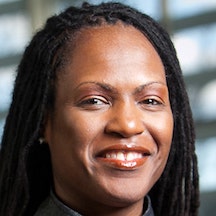A new study by researchers at Michigan State University and Duke University in North Carolina finds that Black women with natural hairstyles, such as curly Afros, braids or twists, are often perceived as less professional than Black women with straightened hair, particularly in industries where norms dictate a more conservative appearance.
Participants in the study evaluated profiles of Black and White female job applicants across a variety of hairstyles. We found that Black women with natural hairstyles were perceived to be less professional, less competent, and less likely to be recommended for a job interview than Black women with straightened hairstyles and White women with either curly or straight hairstyles.
 Ashleigh Shelby Rosette, a management professor, senior associate dean at Duke University’s Fuqua School of Business and co-author of the study, stated that “in the aftermath of the George Floyd murder and the corresponding protests, many organizations have rightly focused on tactics to help eradicate racism at systemic and structural levels. But our individually held biases often precede the type of racist practices that become embedded and normalized within organizations.”
Ashleigh Shelby Rosette, a management professor, senior associate dean at Duke University’s Fuqua School of Business and co-author of the study, stated that “in the aftermath of the George Floyd murder and the corresponding protests, many organizations have rightly focused on tactics to help eradicate racism at systemic and structural levels. But our individually held biases often precede the type of racist practices that become embedded and normalized within organizations.”
“Although there have been some policy changes protecting Black people from discrimination based on their natural hair, these changes are fairly recent and not as widely implemented as they should be,” Dr. Rosette added. “This work illustrates that racial discrimination based on hair can occur, and we hope it can inform new policies and practices for firms to ensure they’re considering candidates equally, and furthermore, aren’t missing out on top talent.”
Dr. Rosette holds bachelor’s and master’s degrees in accounting from the University of Texas at Austin. She earned a Ph.D. in management and organizations from Northwestern University in Evanston, Illinois.
The full study, “Natural Hair Bias in Job Recruitment,” was published on the website of the journal Social Psychological and Personality Science. It may be accessed here.











Because African-Americans receive many direct and indirect benefits from living in a White, Western country, we should be prepared to make accommodations when we can to some of our compatriots.
If straightened hair makes it easier for everyone to feel more comfortable, why is that a problem?
Ewart,
I am afraid you miss the point of “implicit” racial bias. Asking us to conform by forcing our hair into unnatural styles is no different than recognizing that “white” skin would make “everyone” feel comfortable. As a diverse country we should be excepting everyone for the differences not conforming.
Your argument is not convincing.
There is nothing “unnatural” about using heat or chemicals to straighten hair. For over a hundred years, it has been a common practice — because straightened hair is usually easier to manage and, to many people, looks better than the alternative. Since aesthetic preferences are hard-wired in the brain, it is hopelessly idealistic to strive to eliminate every “implicit bias” you can find in a multiracial society. There is bigger fish to fry.
Hey Ewart,
Your dimwitted, ignorant, miseducated, and definitely “racist” comment clearly proves and shows one to three two things: 1) You’re not a “native born Black American”, 2) You’re a White American/or a European, and 3) You’re either an African/Caribbean immigrant Further, you definitely need to read a few thousands history books on the role and contributions “native born Black Americans” made to this country called the USA. Believe it of not Ewart, there would be No such country called the USA if it wasn’t for the historical and current exploitation of “native born Black Americans”. Finally, your type of ignorance is dangerous and therefore, I would suggest that you return to your third would country.
The correct answer is (3) Caribbean immigrant.
The rest of what you’ve written describes you, not me.
I’m not surprised at all Ewart. You’re the type of “Third World Caribbean immigrant” who will pontificate about how great your “Third World Caribbean Island” while living and extracting resources from the USA. Yet, your little “Third World Caribbean Island” is still answers to “The Queen of England” in the 21st century. Your misguided initial response is indicative of having an acute case of Cognitive Dissonance and Stockholm Syndrome. So, time for you to go eat some Jerk Chicken and Coco Bread.
“Ewart” is not Caribbean or real. He is a troll. I have noticed an influx of right wing commentators here that were previously very scarce ever since Insidehighered.com disabled their comment features. I suspect that this “Ewart” is the same person spewing different right wing propaganda using different names on multiple JBHE articles that have recently been popping up at higher frequency.
Thanks for information on “Ewart”.